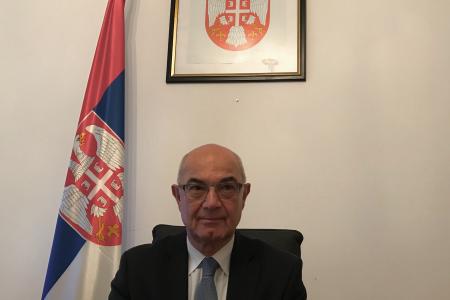4. What are the current central projects in the cooperation between Serbia and Germany in the field of science and higher education?
H.E.: Germany is a valuable partner in the field of education, where most of the efforts are focused on assisting the overhaul of Serbia’s secondary education system, i.e. introducing dual education and orienting the curriculum in line with the market needs. The cooperation in the field of higher education takes place mostly on the peer-to-peer level, between Universities, in the framework of Erasmus+ and other European programs in which Serbia is a partner. We as an Embassy are always there to help push trough good initiatives and ideas. Currently, one of the main goals is to boost the interest for South Slavic studies and the learning of Serbian as a foreign language in German universities – among them, principally, Friedrich-Schiller University in Jena and Humboldt University in Berlin.
5. What steps would Serbia like to take with regard to the intended EU membership in this area?
H.E.: I am pleased to say that the two chapters in our accession negotiations with the EU, that are directly related to this area (25 – Science and Research; 26 – Education and Culture) were among the first to be opened and the only ones that are provisionally closed so far. EU is also about mobility, exchange and building networks, and Serbian students abroad can quite frequently be considered our best ambassadors. Worth mentioning is that since February 2019 Serbia upgraded its status in Erasmus+ from Partner to Programme Country – offering more opportunities and less paperwork for Serbian students heading for Europe and European students coming to Serbia.
6. How do you assess Expatrio’s role in facilitating access to higher education?
H.E.: I am sure that dynamic start-ups, such as Expatrio, can contribute to making this whole process less burdensome for foreign students.
7. What significance do the Serbs studying in Germany have in the framework of the bilateral relations?
H.E.: The academic and practical know-how that they bring back to Serbia is a much needed commodity. We are striving to catch up – and to lead, where possible – when it comes to Industrialization 4.0 and digitalization, and the skills brought back to Serbia by our students studying in Germany are a most valuable asset in this regard.
Expatrio gratefully thanks the Ambassador of the Republic of Serbia to Germany, H.E. Dr. Dušan Crnogorčević for the Interview. The interview was performed by Alex Ruthemeier (Co-Founder) and Urs Unkauf (Director Public Affairs).

